Publishers and brand managers are already trying to pinpoint what catches the attention of a generation that’s yet to come of age.
Gen Z is expected to represent 40 percent of all consumers by 2020. There are roughly 60 million teens in the U.S. alone, and they have $44 billion in annual buying power.
They’ve been called “millennials on steroids,” but also “the anti-millennials.” So, what sets them apart from the generation that has already been fussed over so much?
Using NewsWhip Analytics, we studied a year’s worth of social media engagement data, sampling websites, Facebook Pages, Instagram handles and YouTube accounts that have a large audience of Gen Z consumers, and then examining which stories and content pieces energized and interested Gen Z.
Here are the findings:
1. They want to hear about real experiences.
Anything is fair game to Gen Z. Social media has broken down established marketing and storytelling boundaries—which are foreign to Gen Z kids, most of whom have grown up with social media.
We found that both personal confessionals and weird or emotional human-interest stories tended to drive strong engagements. Soul-baring secrets and confessions are the driving force behind Whisper, a popular Gen Z app-turned-publisher.
Check out this story from Awesomeness TV on a teen taking his senior photos at a Taco Bell:

Other viral stories are sentimental and lend themselves to common or extraordinary human experiences. This story from BuzzFeed about an LGBT couple recreating a photo from 24 years ago was one of the site’s top stories in 2017.
[EVENT: Learn how to boost buzz, build brand recognition and engage employees on the hottest social media platforms.]
2. They want relatable memes and personal interaction.
Instagram is a hotspot for Gen Z publishers. From a sample of nine publishers and brands popular with Gen Z on Instagram, all but Teen Vogue saw a measurable increase in average engagements per post.
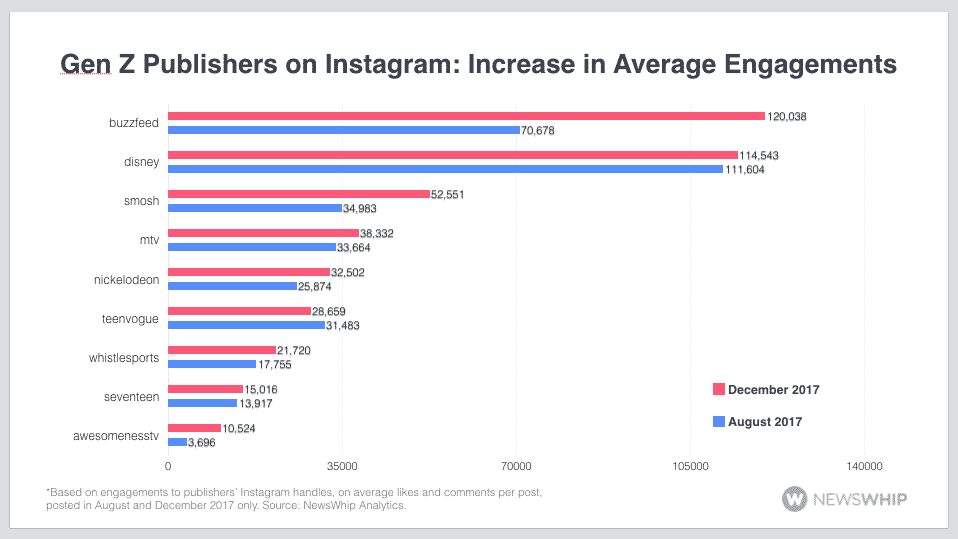
The most popular posts are often relatable memes that home in on common experiences or feelings, such as the Buzzfeed post below.
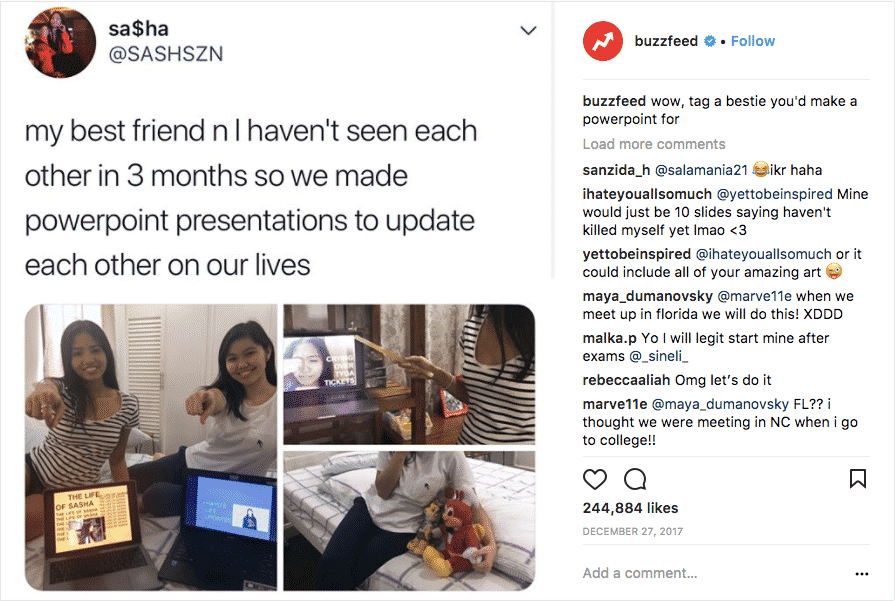
Gen Z also leans into the communal aspect of social media. Asking users to tag a friend is an effective way to facilitate discussion and further engagement, as is user-generated content.
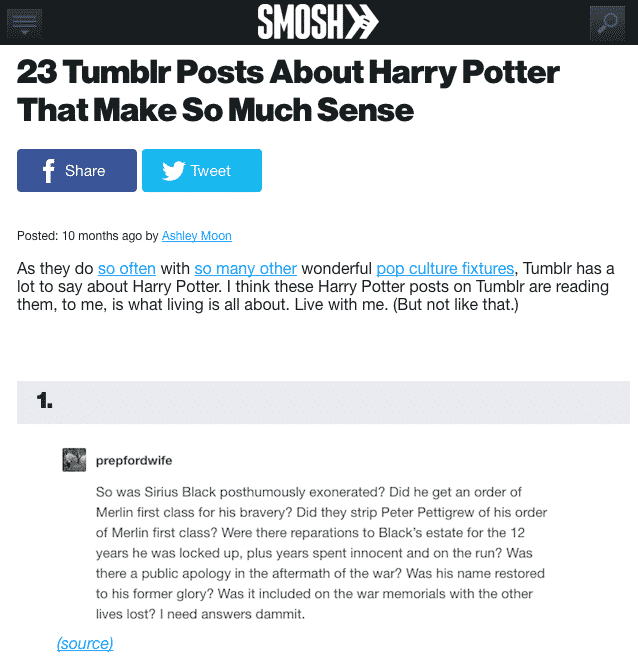
User-generated content is effective on many levels. It lets people feel that they’re part of a connected experience, and it allows their voice to be heard. Brand managers can also solicit user-generated content to spark discussion and spur creativity.
3. Being socially conscious is crucial.
Many names have been coined for members of Gen Z, but a defining characteristic is their socially consciousness. Going beyond their own worldview, many are regularly engaging with content about politics, gender equality, LGBT rights and abortion rights.
Teen Vogue has taken notice. Just look at its themes and engagement numbers for 2017.

Politics have even permeated more lighthearted publishers. Smosh, which has a big Gen Z fanbase, saw its top Facebook post of 2017 come from a video poking fun at Donald Trump’s infamous "covfefe” tweet.

Topics such as “Joe Biden memes” also went viral in 2017. Political content resonates with Gen Z.
4. It’s OK to address personal issues.
Generation Z is vocal about the problems affecting them on a personal level. Topics like bullying, anxiety, body shaming and mental health are frequently the focus of viral stories.
This video from BuzzFeed was viewed more than 101 million times and has driven more than 1.2 million engagements:

This trend has spilled into entertainment, as evidenced by the massive popularity of Netflix’s suicide-themed drama “13 Reasons Why.”

This story from MTV News drove nearly 60,000 engagements on social media:

5. They have generational heroes.
The emerging generation of young people might be cynical and flighty, but they admire celebrities who take on serious issues. Take Selena Gomez and her public struggle with lupus, or Demi Lovato’s challenges with bullying and eating disorders.
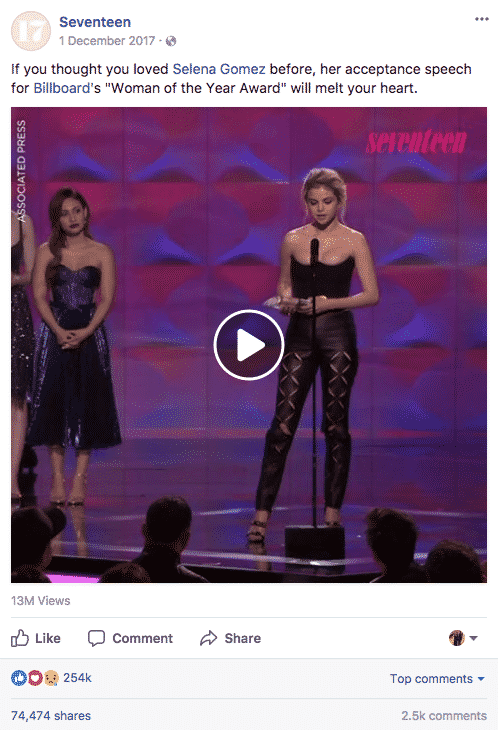
Changing the world is not a prerequisite for adoration, however. The top stories analyzed from last year featured the likes of former and current Disney Channel stars, the Jenners and Kardashians, the Hadids, Beyoncé and Justin Bieber. Actors from “Harry Potter,” “Stranger Things,” and “Riverdale” got plenty of love as well.
6. They do have beloved brands.
Millennials are said to favor “experiences over things.” Gen Z likes the things.
Product announcements from beloved brands performed well last year—especially if they had an air of exclusivity. For example, this story about Starbucks’ secret tie-dye drinks popped up several times in the analysis.
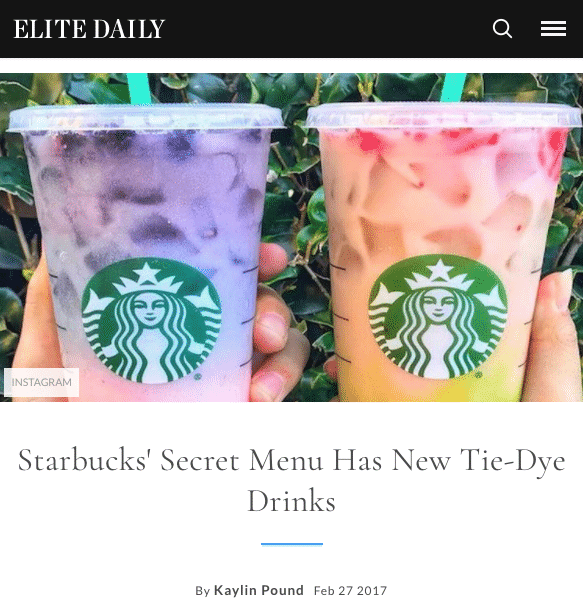
Also, it’s hard to overstate how much the Gen Z audience seems to love Disney. The amount of mentions Disney generated from other publishers last year was astounding. Disney tattoos, film and TV announcements, fan art, memes, Disneyland employee confessionals, resort news, new products—Disney devotion borders on religious fervor.
This BuzzFeed video drove more than 13 million views, along with more than 557,000 engagements:

7. They’re already nostalgic about being ’00s kids.
If you thought the roundups about ’90s kids were ubiquitous, it appears the nostalgia train is full-speed ahead for ’00s pop culture.

Some of the top stories from last year were about early ’00s hits like “Club Penguin,” “High School Musical,” “Hannah Montana,” “Jersey Shore” and “LazyTown.”
8. They home in on the weird and whimsical.
Fun and weird news tended to do well. Gen Z is receptive to both current events and quirky stories.
Tokyu Otaku Mode is more of a niche publisher, but it has a solid Gen Z following. This bizarre “how-to” video was one of its top posts of 2017:

Young people are flooded with millions of digital objects every day across their various feeds. Content must be interesting or offer them something of value to stand out.
The keys to creating content for Gen Z
There’s no magic formula for reaching young people today, but there’s plenty we can glean from those who are excelling in this frenetic digital era. Here’s a recap of what to consider for reaching Gen Z on social media:
- Share personal experiences and human interest stories.
- Be relatable; speak to commonly shared feelings or experiences.
- Don’t shy away from politics or personal issues affecting Gen Z.
- Incorporate Gen Z heroes into content in genuine ways.
- Reference their beloved brands or pop culture favorites.
- Stir up feelings of nostalgia.
- Be lighthearted but authentic; catch their attention with weird and fun stories.
Gabriele Boland is NewsWhip’s communication manager. A version of this post first appeared on the NewsWhip blog.
(Image via)
from PR Daily News Feed http://ift.tt/2nWvZ7g
No comments:
Post a Comment